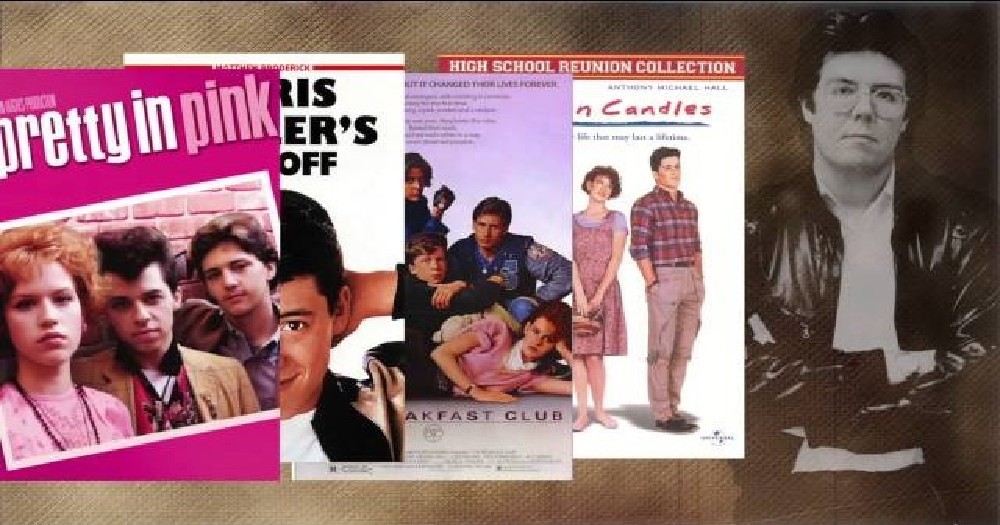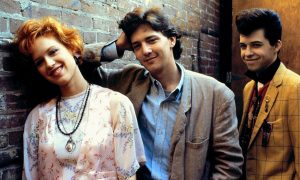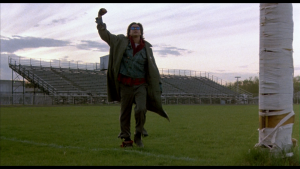What is striking about these films is Hughes’ representation of the outsider, which is largely shown through his ‘queer’ characters, and how he aligns them with the insiders, the popular kids, by the final reel. Think of Allison in The Breakfast Club (1985) or Duckie in Pretty in Pink (1986), both on the outside, both vilified for being ‘freaks’. For me, these two characters have always held the most intrigue, identifiable to me as a young gay man through their struggle for acceptance and rejection of rules that govern the worlds in which they live. In Hughes’ universe, that rejection of dominant mores is what eventually makes the outsiders part of the group, rather than apart from it.
In light of this, I have outlined some of the key messages that the queer community can take from the films of John Hughes.
Taboo Subjects Should Be On The Table
The ‘outsider’ is seen most evidently in Hughes’ seminal classic The Breakfast Club. It’s the movie that made Simple Minds’ ‘Don’t You (Forget About Me)’ into a mega-hit and arguably established Hughes as one of the most bankable screenwriters in Hollywood in the mid-eighties.
The most memorable scene in the film is the notorious “confession circle.” The audience is presented with the five main characters as they sit down for what becomes an emotional, direct and honest conversation. Hughes is clever in his depiction of common American stereotypes, most notably, the image of the jock (Andy), popular girl (Claire), rebel (John), geek (Brian), and outcast (Allison).
[embedyt] https://www.youtube.com/watch?v=Ml0zRkknbWo[/embedyt]
The scene largely runs in a series of monologues as the teenagers open up about deep and personal struggles. For Brian, this means speaking for the first time about his attempted suicide. It’s a taboo subject matter for a teen coming of age drama, which we can see even in more recent times with the backlash against Netflix series Thirteen Reasons Why, which has been criticised, amongst other things, for potentially glamourising suicide. For Hughes, to bring up the subject matter in a conservative Reagan era, was daring and risky.
For me, as a young gay man growing up in rural Monaghan, the scene showed me that what we hide inside often becomes our greatest demon. In the film, for people like Andy, it’s the pressures of performance when it comes to sport, whilst for others like Brian, it’s an aspiration for perfection that’s tearing him apart. It’s ultimately Hughes’ bravery to talk about the ‘taboo’ that breaks down social boundaries and allows us to resonate more deeply with the characters and their multi-dimensionality as people.
The Truth Is A Good Idea
In light of this, what we can take from Hughes’ films is the message that our truth is a powerful energy source and one that we can access when we need to.
This is perhaps the greatest message that a queer youth can take from the John Hughes canon. Of course, we all have different environments and depending on our situation, it might not be safe for us to tell our truth. In light of this, what we can take from Hughes’ films is the message that our truth is a powerful energy source and one that we can access when we need to.
Take Pretty in Pink as a prime example, where we see a young Molly Ringwald struggle with the nuances of being a teenager, whilst also battling against discrimination based on her class and social standing. This is seen most evidently in that notorious scene where Addie (Ringwald) confronts her former love interest Blane (Andrew McCarthy), who has been avoiding her because he’s ashamed of how his friends will judge him for dating a working-class girl.
In the most powerful scene in the film, she confronts him with the declaration, “Just tell me the truth!” Even today, it’s enough to make you grit your teeth and fist-pump at the same time, as Addie is relentless, powerful, and assertive in her quest for the truth.
It really resonates with me, as I have never been that brave in a relationship. Also, it is evident that Addie has also been avoiding the truth, as she has deluded herself into thinking Blane is a worthy and adequate partner. In choosing to confront Blane, Addie actually confronts herself, and the line “just tell me the truth” is indicative of the lie Addie has been telling herself internally.
This resonated with me on a multitude of levels. Perhaps most noticeably, as a gay man, is the mistruth I lived under prior to coming out. I used to think the truth was hurtful, avoidable, and would cost me a lot. However, when I saw characters like Addie confronting her own truth, it opened up the same possibility for myself.
The Best Is Yet To Come
I think one of the most lasting impressions of the John Hughes canon, is the idea that our future holds endless possibilities if we are brave enough to take control of it.
Addie, through a period of self-actualisation, learns who she really is, with her world opening up after she rids it of the toxins. Similarly, in The Breakfast Club, John’s fist-pump as Don’t You (Forget About Me) plays in the background, demonstrates the power of opening up and becoming your true self.
The message is strong. The idea that our best days are ahead of us has to be wired somewhere in the collective queer unconsciousness. I think any group that has faced persecution, rejection and discrimination holds on to the idea of hope and change, even in the face of mass opposition.
This, for me, is the most lasting of Hughes’ teachings, that hope springs eternal, especially for those strong enough to brave out the storm.
© 2018 GCN (Gay Community News). All rights reserved.


